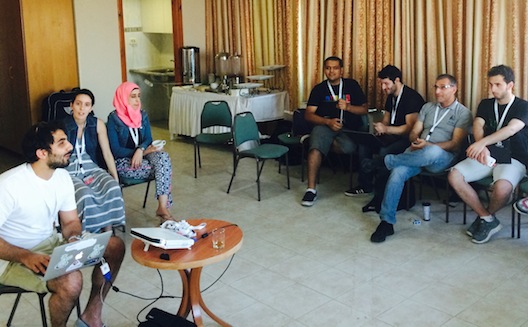First West Bank hackathon 'a new step' for Palestinian tech ecosystem


With a growing tech sector and startups starved for talent, there is a need for everyone in the Palestinian technology sector to come up with innovative ways to train and identify talent. One such way is hackathons. Last week Ramallah-based hotel bookings site Yamsafer held Palestine’s first purely technical hackathon, CodeChiefs, with support from VC (and investor in Yamsafer) Sadara Ventures, to which I was lucky enough to be invited to participate. Below is my experience, both as a participant in the event, and as an outsider looking in at the Palestinian technology sector.
The event, held at a beach resort in Jericho, kicked off last Thursday afternoon. There were 16 Palestinian coders at the event with a variety of backgrounds, including university students, online freelancers, outsource workers, and of course startup employees and founders, including Yamsafer. After greeting each other, we started discussing the our ideas and the technologies we wished to used, eventually forming four teams of four members each.
It was then time to get down to work. Each team found its way to our assigned beach bungalows, found our colored team t-shirts, and got to work. The first task was to figure out which technology stack to use and define the product, so we could all pull in the same direction. (Our team decided to use a combination of rails on the backend, a phonegap/backbone combo on the frontend and – a Friday addition – a native Android app.)
With only three days to work we started building straight away and quickly built the backend, although the phonegap setup took a little longer than expected (hence why we chose to also do native Android development). As we got underway, we quickly went to join the other teams, who were already concentrated around the few places at the resort with power outlets, stable wireless internet and air conditioning.
Spending time with the other teams was also our chance to see what they were working on and benchmark our progress against the rest. All teams were working within six themes that were broadly related to Yamsafer’s operations (travel APIs, analytics, business intelligence, meta-data, mobile geolocation and mobile gaming), yet the ideas that the teams came up with were very different.
One team worked on a social app that would allow people to follow their friends’ specific feeds on social networks (e.g. listen to all music from selected friends or curate all links), another team worked on a system that would write automatic reviews based on the inputs given, while the third team built a tool to help Yamsafer make better decisions on which hotels to bring into the fold. My team built an app to help people living in the West Bank alert each other to road closures due to clashes or military checkpoints.
On Saturday all teams presented their ideas, their process, and what they had created over the weekend, and everybody got to vote for the team they thought should win. In the end it was the red team that won, with their hack to write automatic reviews. Of course, with an event like this everybody was a winner and we all left Jericho in high spirits, happy with all we had learned :)
 While it would be easy to end my
reporting here, I also want to share some observations on the state
of the Palestinian technology ecosystem and what’s still left to
do. With hiring being one of the key challenges of launching
startups anywhere, it is good sign that members of the community
are stepping up to invent new ways to train, identify, and attract
talent.
While it would be easy to end my
reporting here, I also want to share some observations on the state
of the Palestinian technology ecosystem and what’s still left to
do. With hiring being one of the key challenges of launching
startups anywhere, it is good sign that members of the community
are stepping up to invent new ways to train, identify, and attract
talent.
Further, by hosting a small, more intimate event, CodeChiefs and similar hackathons can help foster the communities of innovators that will build the next generation of Palestinian companies and can hopefully also be a way for Palestine to connect with top entrepreneurs worldwide.
With that said, CodeChiefs also highlights some of the challenges that the Palestinian technology sector needs to overcome in order to unlock its full potential as a Middle Eastern startup hub. It was very clear this was the first grassroots hackathon and with 16 people attending I would expect the next hackathons to be bigger and even better (not that this one wasn’t good). Further, it would serve ecosystem well to have a bigger focus on technologies, rather than the specific hacks created; sometimes it’s better to create a simple project to learn a new technology or framework rather than try to make the best app over the course of the hackathon.
All in all CodeChiefs was a great success and hopefully the start of a new step in the evolution of the Palestinian technology ecosystem. With the global rise of hackathons it is only natural that they would also make it to Palestine at some point. CodeChiefs was an awesome experience and I can’t wait to be back :)


